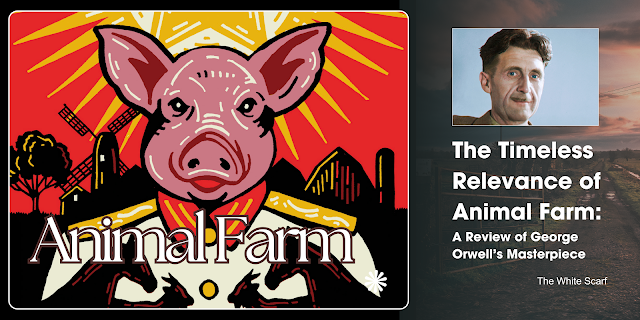The Timeless Relevance of Animal Farm: A Review of George Orwell’s Masterpiece
A Book Worth Reading Over and Over Again
There are books you read once and move on, and then there are books that pull you back, again and again, revealing something new with each read. Animal Farm by George Orwell is one such book for me. I just finished rereading it, and honestly, I don’t mind flipping through its pages over and over. The simplicity of its storytelling, combined with its deep political and social themes, makes it a book that remains relevant no matter how many times you revisit it.
About George Orwell
George Orwell, born Eric Arthur Blair in 1903, was an English writer, journalist, and critic. He is best known for his works that explore themes of totalitarianism, social injustice, and the manipulation of truth. His most famous novels, Animal Farm and 1984, serve as powerful critiques of oppressive political regimes. Orwell's experiences in the Spanish Civil War and his deep opposition to authoritarian rule heavily influenced his writing. His sharp insights into power and propaganda continue to resonate in modern times, making his works essential reading for those interested in political and social issues.
A Brief Review of Animal Farm
Animal Farm is an allegorical novella that tells the story of a group of farm animals who overthrow their human owner in hopes of creating a society where all animals are equal, free, and happy. However, as the pigs, led by Napoleon, take control, the revolution spirals into tyranny, exposing the corruption of power and the fragility of ideals.
Orwell masterfully uses animals to symbolize different figures and movements from the Russian Revolution of 1917. Napoleon represents Stalin, while Snowball, the more idealistic pig, is akin to Trotsky. The naive and hardworking horse, Boxer, embodies the working class, who remain loyal despite suffering the consequences of their leaders’ betrayal.
The brilliance of Animal Farm lies in its simplicity. Orwell’s use of plain language and fable-like storytelling makes it accessible to readers of all ages, yet it carries profound messages about power, propaganda, and oppression. The novel remains a powerful critique of how revolutions can be manipulated to serve the interests of a select few, rather than the collective good.
Modern Metaphors
Even in today's world, the themes of Animal Farm remain strikingly relevant. Figures like Donald Trump and Elon Musk embody some of the novel’s core ideas in different ways.
Donald Trump as Napoleon: Much like Napoleon consolidates power and manipulates the truth for personal gain, Trump’s tenure as U.S. President saw a heavy reliance on misinformation, populism, and an ‘us vs. them’ mentality. His ability to control narratives, dismiss critics as ‘fake news,’ and amass a loyal following mirrors the tactics used by Orwell’s authoritarian pig leader.
Elon Musk as Snowball (or Squealer?): Musk is often seen as an idealist, much like Snowball, pushing for grand innovations and a reimagining of industries. However, some view him as more of a Squealer-like figure, using his influence on social media to shape public perception, silence critics, and spin narratives to his advantage—whether it's about Tesla, SpaceX, or Twitter (now X). His ability to shift public discourse with a single tweet shows a level of propaganda influence that Orwell himself would have found fascinating.
Animal Farm reminds us that power, once obtained, is rarely relinquished without struggle. Whether in politics, business, or media, figures like Trump and Musk demonstrate that the dynamics of control, influence, and manipulation remain as relevant today as they were in Orwell’s time.
Fun Facts About Animal Farm
1. “All Animals Are Equal, But Some Are More Equal Than Others”
This famous quote from the book is a chilling reminder of how ideals can be twisted to justify inequality. What starts as a revolution for fairness quickly turns into a dictatorship where the ruling class (the pigs) enjoys privileges while others suffer.
2. Banned and Controversial
Despite being a widely respected novel, Animal Farm has been banned in several countries over the years. The Soviet Union prohibited it due to its anti-communist message, and even today, some governments see it as politically sensitive.
3. Inspired by Real History
Orwell didn’t just create a random animal rebellion—he was directly inspired by real events. The Russian Revolution, the rise of Stalin, and the betrayals within communist leadership are all reflected in the book’s plot and characters.
4. Orwell Had Trouble Publishing It
Believe it or not, Orwell struggled to get Animal Farm published. Many publishers feared backlash due to its critique of Stalin’s regime, which was an ally of Britain at the time. It wasn’t until 1945 that the book was finally released.
5. The Role of Propaganda
Squealer, the pig who spreads false information, represents propaganda machines used by totalitarian governments. His ability to manipulate language and twist facts mirrors the real-life tactics used to control public perception.
Final Thoughts
Animal Farm isn’t just a novel—it’s a warning. Orwell masterfully illustrates how power can corrupt even the noblest intentions. Though it was written nearly 80 years ago, its message remains alarmingly relevant today. If you haven’t read it yet, I highly recommend picking it up. And if you have, maybe it’s time to read it again—you might discover something new.
What are your thoughts on Animal Farm? Have you read it? Let’s discuss in the comments!

